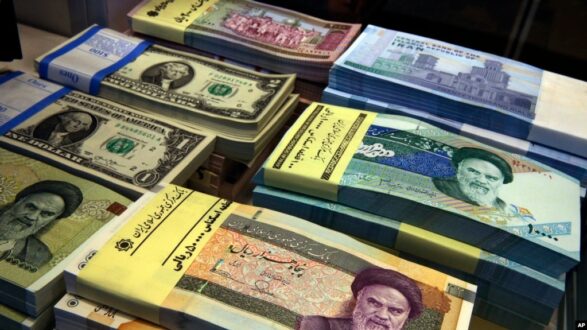Al-Monitor – The Iranian government named a new governor for the country’s central bank, and arrested 96 currency brokers in an attempt to halt unprecedented plummeting of the national currency.
Following a cabinet meeting in Tehran on Thursday, Mohammad-Reza Farzin replaced former central bank governor Ali Saleh-Abadi, who resigned from his post following weeks of pressure.
According to the state-run IRNA news agency, President Ebrahim Raisi advised the new governor “to consult observers” in his decision-making. Prior to the reshuffle, the 57-year-old economist was serving as the director of Bank Melli, Iran’s largest state-run bank.
The replacement comes after weeks-long sharp declines in the value of the rial, and one day after it dropped to all-time lows, with one US dollar sold for 440,000 rials. The troubled market had triggered the removal of the central bank’s foreign exchange chief only two weeks ago.
Amid the historic fall in the rial’s value, shop owners at Alaeddin Commercial Center, the biggest tech market in central Tehran, rolled down shutters on Wednesday due the uncertainty, the Iranian technology news monitor Tehcrato reported.
Iranian authorities also said they had arrested 96 currency dealers in Tehran on Thursday. According to Tasnim news agency, the Tehran police deputy for economic security, Hedayat Bahrami, said the arrests were for “unauthorized” currency transactions on the streets. The total amount seized, according to the report, was US $118,000.
The arrest of the brokers repeated the pattern that Iranian authorities have followed in recent currency fluctuations. However, they have never eased the turbulence. Economic experts at home argue that the government is ignoring the root causes of the currency collapse, from systemic corruption to the lack of long-term monetary policies that could boost currency reserves.
Unrest at home, failing diplomacy abroad
Those reserves continue to dramatically shrink as Iran has been grappling with international banking sanctions, particularly since the 2018 withdrawal of the United States from the 2015 nuclear deal, formally known as the Joint Comprehensive Plan of Action (JCPOA).
The recent stalemate in JCPOA revival talks has accelerated the rial’s downward trend. Iranian Foreign Minister Hossein Amir-Abdollahian was in Oman on Wednesday, meeting with the country’s Sultan Haitham bin Tariq Al Said. Muscat has been closely involved in mediation talks between Iran and the United States and is believed to have brokered the preliminary US-Iran talks in 2013.
Yet on the very same day, Germany, a key signatory to the JCPOA, expressed its reluctance to revive the deal, citing the ongoing protests in Iran which have met an iron-fist response from the Islamic Republic.
The protests and the currency crash have led many Iranians to exchange their assets for US dollars. Many are sharing pictures online explaining how they had to pay hundreds of millions of rials for a few $100 bills.
A group of mourners who gathered at a cemetery in Tehran on Thursday to commemorate the death of a 19-year-old protester chanted, “Poverty, corruption, inflation, we will keep on protesting until the overthrow [of the regime].”
 Shabtabnews In this dark night, I have lost my way – Arise from a corner, oh you the star of guidance.
Shabtabnews In this dark night, I have lost my way – Arise from a corner, oh you the star of guidance.



